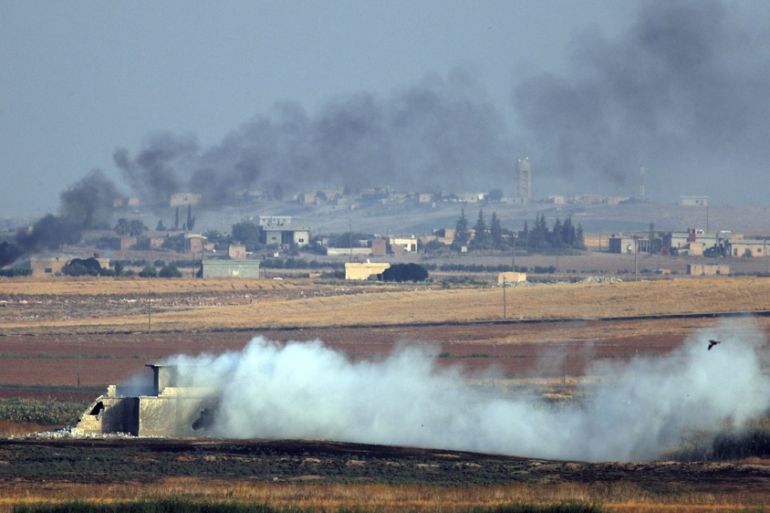Trump’s Syria policy dismays Europe as Turkey launches campaign
EU leaders to face questions on what’s next for foreign fighters detained in Syria and their loyalty to Kurdish forces.

Confusion reigns in Europe over the motives behind US President Donald Trump’s shock pledge to withdraw US forces from northern Syria, a decision met with dismay from many quarters.
The move, which signals a shift in policy, could complicate relations with Turkey and exacerbate strains between the United Kingdom and France, both of which have troops in the region. It also leaves a former ally unsupported in the face of a Turkish offensive.
Keep reading
list of 4 itemsAslan, a little Syrian boy’s journey to hear again
Student, volunteer, shopowner: NW Syria’s Shaima defies limitations
World Food Programme to end general assistance in northwest Syria
- What is happening at the Syria-Turkey border?
- Look: Civilians fleeing Turkey’s operation in Syria
- Does anybody think Turkey’s operation is a good idea?
Trump has left unprotected the Kurdish-led Syrian Democratic Forces (SDF) – his former allies in the campaign against the Islamic State of Iraq and the Levant (ISIL or ISIS) group – provoking cries of betrayal from the SDF and opposition from world leaders.
Ankara has branded the People’s Protection Units (YPG) – which lead the SDF – as “terrorists” over their perceived links to the Kurdistan Workers’ Party (PKK), a group Turkey has been battling for decades in its territory.
European anger
Trump had not warned London and Paris about his decision and there is speculation that the UK under Prime Minister Boris Johnson may fall in line with the US and further itself from European allies.
“At this moment in time, there is shock and condemnation from the European governments, which most Kurdish activists would welcome, but what could they do to actually stop Trump from behaving this way or to stop Turkey from invading SDF-held parts of Syria?” said Christopher Phillips, reader in international relations of the Middle East at Queen Mary, University of London.
This was not the first time Trump talked about this, having ordered a full troop withdrawal in December 2018, which he reversed after strong opposition from the Pentagon – with then-Secretary of Defense James Mattis resigning – and pushback from US politicians and US allies.
“Although we don’t actually know what this withdrawal is going to look like yet and we don’t know exactly to what extent the Turkish intervention has been given a green light, it is actually consistent with what Trump has been trying to do for a year and a half,” said Phillips.
“On the other hand, this is an area that, militarily, Britain and France have committed to and cooperated in with the US – and they haven’t been consulted at all on this decision, which is uncomfortable for them.”
In response to Trump’s announcement, UK Foreign Secretary Dominic Raab reportedly made a rare complaint in a telephone call to US Secretary of State Mike Pompeo, who on Wednesday denied giving Turkey the green light for its military campaign in Syria.
|
|
Observers were quick to point out that French President Emmanuel Macron has been a vociferous supporter of the Kurds.
In response to Trump’s first withdrawal announcement in December, Macron responded testily, saying “an ally must be reliable”.
In April, the French president received Kurdish leaders in Paris and guaranteed them his support.
Trump’s failure to consult before his latest announcement, according to Le Monde, meant that “the embarrassment in Paris, the western capital most committed to the Kurds, is all the more obvious”.
A key problem facing European countries is the lack of clarity around US strategic policy in Syria.
Michael Stephens, research fellow for Middle East studies at the Royal United Services Institute (RUSI) think-tank in London, said: “It is fair to say that this decision has not gone down well in the UK or France, and I think we have been left in the lurch a bit and are having to play a reactive strategy to a president who doesn’t have a strategy.”
“It is very difficult to know exactly what the US is aiming at here and what their strategic priorities are… So from a European perspective, it’s a confusing time and difficult to come up with a response.”
ISIL detainees
A key question posed by the US withdrawal and Turkish military operation is the fate of the foreign fighters – many of them European – captured and held by Kurdish forces in Syria, an issue that will complicate relations between the European leaders and Turkey’s President Recep Tayyip Erdogan.
“If this supposed agreement between Erdogan and Trump does take place whereby Turkey becomes responsible for ISIL detainees, that is a major shift in the broader counter-ISIL strategy, one that again has not been discussed with European NATO allies, and it opens the prospect of a very different dynamic between Turkey and Europe,” Phillips said.
“Turkey will, in theory at least, hold the responsibility for the detention of ISIL captives, which puts the European powers in quite a difficult position.”
Stephens of the RUSI think-tank said there have been lengthy discussions between the Trump administration and European leaders about who should take responsibility for former ISIL fighters, and at the heart of the problem is the reluctance of the European countries to take them back.